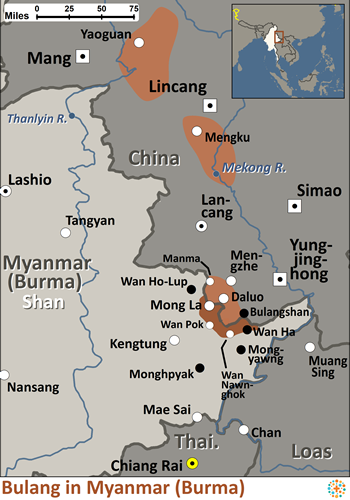The Blang are a complex group to classify as they are a collection of smaller groups with various dialects and customs. Tribal or subgroup names often associated with the Blang include Angku, Puman, Kong Ge, and Samtao. In Operation Myanmar the Samtao tribe has been profiled separately, as their language is not mutually intelligible with Blang. The 1931 census of Burma returned 11,856 “Tai Loi” people, who may have been a combination of smaller Mon-Khmer speaking tribes in Shan State, including the Blang. Of that number, 122 people (1.0%) were Christians and the rest were Buddhists.
Location: Approximately 15,000 Blang people live in two main areas of northeast Myanmar's Shan State: in and around the town of Kengtung, and further north in Mongyang Township on the Chinese border. Over 100,000 Blang live in Yunnan Province, China, where they are one of that country's official minority nationalities. In China their name has been transliterated “Bulang.” Their villages on both sides of the border tend to be situated on the sides of thickly forested mountain slopes, making them a difficult group to visit. A small number of about 1,400 Blang people also live in Thailand where they call themselves Khon Doi, meaning “mountain people.”They come from 200 families that fled China to avoid Communist persecution in the 1960s. They settled in Myanmar for a while before making their way to Thailand in 1974.
Language: Blang is noted for its great linguistic diversity. Although five dialects have been identified among them in Myanmar, one survey found as many as ten dialects spoken in just one Blang refugee village in Thailand. In China two different scripts are used by the Blang, one called totham and the other tolek. Blang is part of the Mon-Khmer branch of the Austro-Asiatic linguistic family, which includes widely-spoken languages such as Wa and Palaung. Some Blang people in Myanmar are also able to speak Shan, Tai Lue, or Wa as a second language.
The Blang claim to be descended from the ancient Pu tribe, who lived in southwest China until the end of the Han Dynasty (AD 220). For countless generations, the Blang have lived in small ancestral clans, each with their own land. All clan members were responsible for harvesting the crops, and if a family moved away from the area, they forfeited their right to own land or eat its produce.
Most Blang customs are tied to their belief in Theravada Buddhism. For many centuries they have mixed Buddhism with animistic rituals. Blang women love to chew betel nut, which they spit out into the dirt. It stains their teeth black, which is considered a mark of beauty. Some Blang families bury their dead in coffins in their village cemetery, while those who are more ardent Buddhists cremate their dead at the temple.
Many Blang villages are situated alongside the Shan or Tai Lue, with whom they share Buddhist temples and teachers. One Christian source says: “Temples and idols are scattered throughout their communities. Many Blang men enter the Buddhist monkhood, which brings great honor to their families. Few Blang have ever heard of Christ, and few care to seek for anything beyond what they already believe. Since the arrival of Buddhism they have cloaked their spirit worship with a veneer of Buddhist teachings, but they still fear and appease a large number of spirits.”
Because of their closeknit clan structure and strong faith in Buddhism, few Blang people had ever committed their lives to Jesus Christ until recently. Now, approximately 1,200 Blang people are Christians, most of whom are from the Pangpung subgroup. Although most sources say the Blang New Testament was published in 2020, the translation was done for the Pangpung language group but is unintelligible to people from other Blang subgroups.
Scripture Prayers for the Blang in Myanmar (Burma).
| Profile Source: Asia Harvest Copyrighted © Used with permission |



























